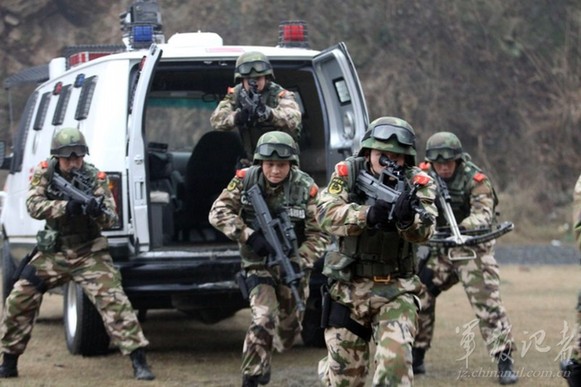Athough the United States has toned down accusations about China's military expansion in its report released on Friday, some judgments made by the Pentagon might still further disrupt rocky Sino-US military ties, some analysts have said.
 |
Chinese soldiers in military training
|
In its annual report on the development of China's military, the US Department of Defense said China is pursuing fast military modernization to help expand its economic and diplomatic interests around the world, including the possible construction of China's first domestically built aircraft-carrier.
It also claimed China was carrying out aggressive cyber espionage. It further pointed out that many of the cases of global cyber intrusion and data theft in 2011 originated within China, and it said the Chinese government is using cyber technology to collect strategic intelligence from the US government and private companies. Beijing expressed its "firm opposition" to the findings of the annual assessment.
The release of the report was also coupled with an action in the US House of Representatives, which voted to force President Barack Obama's administration to authorize the sale of 66 new fighter jets to Taiwan, which China considers to be historically part of its territory.
However, the measure, part of the National Defense Authorization Act, is not likely to get further approval from the Senate, according to US media.
Beijing on Saturday firmly opposed the Pentagon's report and demanded that Washington stop speculating about the intent of China's defense buildup.
"This Pentagon report makes irresponsible remarks about China's justified and normal defense development and spreads the theory that China is a military threat," said Foreign Ministry spokesman Hong Lei.
He said the goal of the limited development of China's military force is to safeguard China's independence, sovereignty and territorial integrity, and it is not aimed at any other country or specific target.
"Countries without hostility toward China should not worry about such developments," he said. "We ask the US side to respect the fact, change the mentality and stop releasing such annual reports."
The People's Liberation Army Daily called the allegations "imaginary threats" caused by the US military's Cold War mentality.
The Pentagon has been issuing an annual report on China's military to Congress since 2000, continuing a Cold War-style practice that the United States once adopted toward the former Soviet Union in an attempt to put pressure on its archrival, according to Xinhua News Agency.
But this year's report is much shorter than previous ones, and it was released in a low-profile manner. Some US analysts and media said that the annual assessment of China's military resembled previous reports but adopted more diplomatic language -possibly to avoid aggravating delicate relations with Beijing.
"I am struck by the decidedly mellow tone," said Christopher Johnson, a researcher with the Center for Strategic and International Studies, in an interview with AFP.
Despite a change in Washington's rhetorical strategy, the United States is not compromising on some issues vital to China's core interests, said Zhai Dequan, deputy secretary-general of the China Arms Control and Disarmament Association. "The sale of arms to Taiwan is one of the most prominent problems."
China's military buildup is a central focus of the Obama administration, which is shifting its attention toward the Asia-Pacific region after a decade of wars in the greater Middle East, the Associated Press reported. The US is not building new permanent bases in Asia but is seeking more security partnerships in the region.
The Pentagon report says that Taiwan remains the PLA's most critical potential mission.
David Helvey, acting deputy assistant secretary of defense for East Asia, at the Pentagon Friday press briefing also said China places a high priority on its maritime territorial claims in both the South China Sea and East China Sea, but there is still "very positive potential" for the two countries to develop a sound military-to-military relationship.
The cooperative signals in the report are to play down its strategic goal of containing China and dominating the Asia-Pacific region, Zhai said.
The report emphasized the US efforts to build a "healthy, stable, reliable and continuous" military-to-military relationship with China, which the Pentagon views as an essential component of the overall bilateral relationship.
China's growing military capability means opportunities for the two countries to tackle the common challenges together, such as noncombatant evacuation, counter-piracy and peacekeeping, according to the report.
SOURCE:


0 comments:
Post a Comment